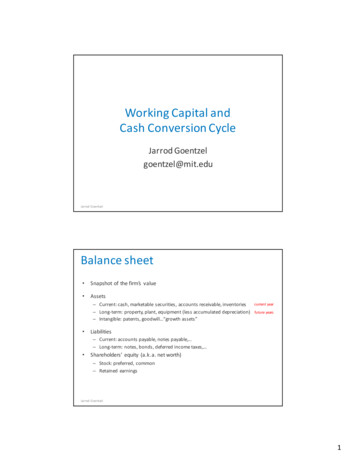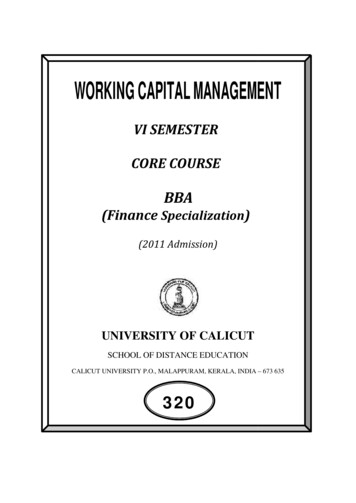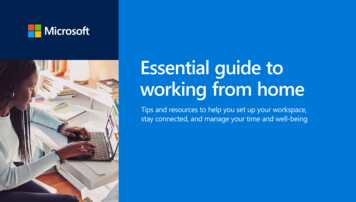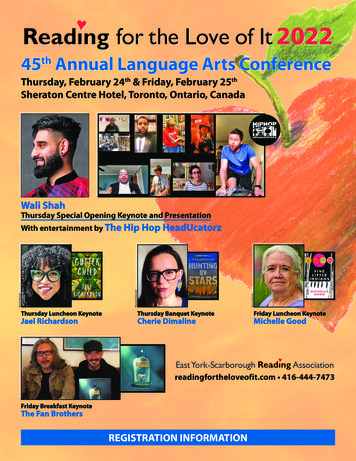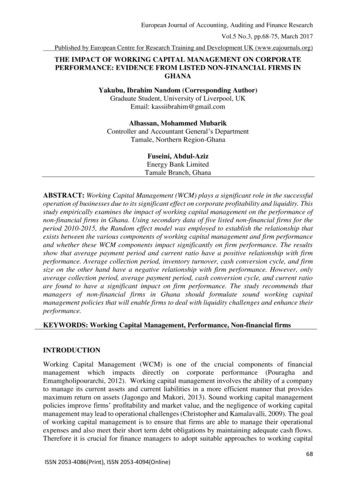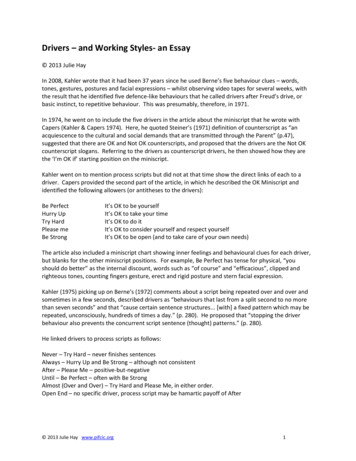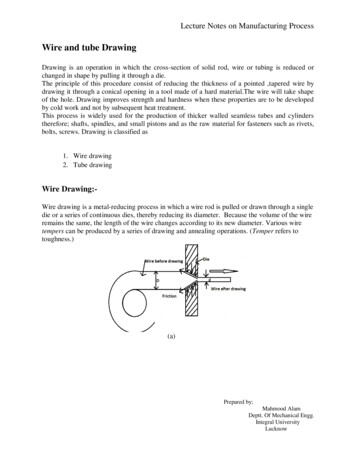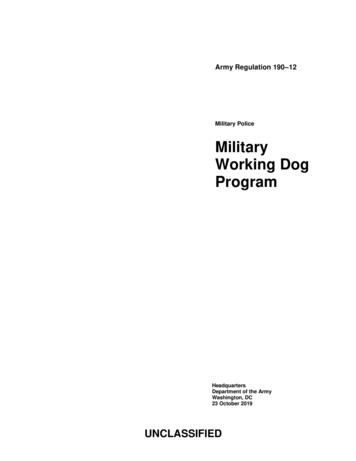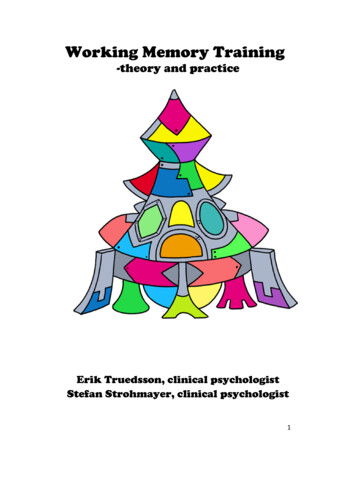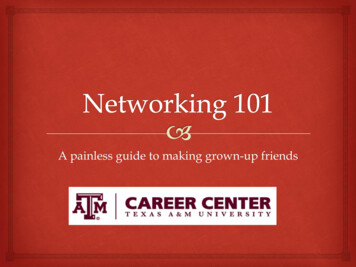
Transcription
1WorkinglifeBACKGROUND1 You are going to watch a TED Talk by Mark Bezos calledA life lesson from a volunteer firefighter. Read the textabout the speaker and the talk. Then work in pairs andanswer the questions.1 What job did Mark Bezos have before and what jobsdoes he have now?2 How do people in the USA feel about firefighters?3 What motivates Mark Bezos?Mark Bezos worked in advertising for many years andnow works for a charity organization, Robin Hood, whichfights poverty in New York City. He is also a volunteerfirefighter in Westchester County, New York, where helives. Firefighting is a highly respected job in the USA. MarkBezos is continuously amazed and motivated by the actsof heroism – big and small – that he sees every day.Mark Bezos’s idea worth spreading is that every actof generosity matters – even the small ones.8B1 SB unit 01 008-017.indd 822/06/15 2:08 PM
FPOReconstruction work,Hassan II Mosque,CasablancaKEY WORDS2 Read the sentences (1–7). The words in bold are used inAuthentic listening skills Dealingwith new vocabularythe TED Talk. First guess the meaning of the words. Thenmatch the words with their definitions (a–g).1 Firefighting is his vocation. He wanted to be a firefighterfrom the age of twelve.2 He was jealous of his colleague’s new office.3 She’s the homeowner – it’s her house and she’s livedthere for twenty years.4 Poor people can get meals from a local soup kitchen.5 In my job as a firefighter, I am witness to a lot ofaccidents.6 When the firefighters arrived, the kitchen was in flames.7 My mother is a retired doctor, but she still works as avolunteer in an old people’s hospital.abcdefsomeone who does a job for no payon firea person who owns a house or flata job or career that you feel fits your aims in lifefeel negatively about someone who has somethingyou wantsomeone who sees an eventg a place where free food is served to people in needWhen you listen to authentic speech, you will hear manynew vocabulary items. Don’t try to understand every word. 3aListen for words that are stressed.Listen for words that the speaker repeats.Stay relaxed and keep listening.1 Look at the Authentic listening skills box. Listento three sentences from the TED Talk. Underline the wordsthat are repeated and circle the words that are stressed.1 Back in New York, I am the head of development for anon-profit called Robin Hood.2 When I’m not fighting poverty, I’m fighting fires as theassistant captain of a volunteer fire company.3 Now in our town, where the volunteers supplement ahighly skilled career staff, you have to get to the firescene pretty early to get in on any action.3b2 Read sentence 4. Which words will be stressed?Which words are repeated? Then listen and check.4 I am witness to acts of generosity and kindness on amonumental scale but I'm also witness to acts ofgrace and courage on an individual basis.9B1 SB unit 01 008-017.indd 922/06/15 2:08 PM
1.11A life lesson froma volunteer firefighter1.1 Mark Bezos tells a story about a time he wentto help at a fire. Watch the TED Talk. Choose the lesson(a–c) that you think Mark Bezos wants us to learn.a We should always help our friends and family first.b Small acts of kindness are as important as big ones.c First be successful in your job and then go out andhelp others.2 Work in pairs. What example did Mark Bezos give toillustrate this lesson? Discuss with your partner.10 profit /ˈprɑfɪt/ N Am Eng profit /ˈprɒfɪt/ BR EngB1 SB unit 01 008-017.indd 1031.1 Watch the first part (0.00–1.06) of the talk again.Choose the correct option to make true sentences.1 Mark Bezos is a professional / volunteer firefighter inhis town.2 At his first fire he was the first / second volunteer toarrive.3 When Mark Bezos found the captain, he was speakingto another volunteer / the homeowner.4 It was the middle of the day / night and it was raining. gotten /ˈgɑt(ə)n/ N Am Eng got /gɒt/ BR Eng22/06/15 2:08 PM
1.1 Read the sentences. Then watch thesecond part (1.06–2.46) of the talk again. Completethe sentences with one word per space.51.1 Watch the third part (2.46 to the end) of the talkagain. Answer the questions.1 What has Mark Bezos learned about the acts of kindnessand generosity that he sees?2 Mark Bezos’s two-word message for his audience is.’ What does he mean by this?‘Don’t3 What is one example of the kind of help we can giveto others?the questions.1 What does the viewer like about the way Mark Bezosdelivered his message?2 Do you agree with her?Viewers’ commentsRachel – I like this talk – a short, everyday story with asimple lesson. It was a small gift from Mark Bezos whichcould make a big difference in many people’s lives.R*The comment was created for this activity.PRESENTATION SKILLS Being authentic11 Work in pairs. What kind of person do you think anaudience most likes to see giving a presentation: aconfident person, a knowledgeable person, a funnyperson, a sincere person? Of these qualities, which ismost appealing to you, and why?12 Look at the Presentation tips box. What kind of persondoes it suggest people like to listen to?6 Work in pairs. Discuss other ways that people can helpWhen you give a talk, it’s important to be yourself and foryour personality to come through. Follow these steps:their communities. What could you do?1.2 Watch the clips from the TED Talk. Choose thecorrect meaning of the words.8 Work in pairs. Complete the sentences in your ownwords.TIPSVOCABULARY IN CONTEXT71 There’s a pretty good chance that next year I will 2 I’m pretty much done (-ing) 3 The three things that matter most to me are CRITICAL THINKING How a messageis delivered9 Work in pairs. Read the conclusion or ‘message’ of MarkBezos’s talk. How did he get this message across?Choose the best answer (a–c).‘Don’t wait until you make your first million to make adifference in somebody’s life. If you have something to give,give it now.’a with different examplesb with visuals / picturesc with a simple story1 The captain asked the other volunteer to rescue afrom inside the house.that the other volunteer2 Mark Bezos feltcould tell people he saved a living animal.3 The captain asked Mark Bezos to go into the houseback some shoes.and4 He carried the shoes back downstairs and gave them to.the5 A few weeks later, the homeowner sent a letter thankingthe fire department, in particular for saving her.10 Read this comment* about the TED Talk. Then discussUnit 1 Working life4131 Write your talk yourself. Use words and expressionsthat you would normally use so that your wordsconvey your personality.2 Speak from the heart. Talk about things that youknow about and believe in.3 Don’t worry if you are nervous. An audiencesometimes warms more to someone who is nervousthan someone who is full of confidence. They wantyou to succeed.4 Relax your body. Try to move and gesture as younormally do.1.3 Watch the clip from the TED Talk. Then answerthe questions.1 Does the audience ‘warm’ to Mark Bezos? How canyou tell?2 Which points (1–4) from the Presentation tips box do youthink Mark Bezos follows in his talk?14 You are going to give a two-minute mini-presentation.Make some brief notes to present what you do for a livingor what you are studying. Explain some surprising thingsabout your job or studies – what people may not knowabout it – and/or the aspects of your job or studies thatyou like or dislike.15 Work in pairs. Give your presentation. Use the advicefrom the Presentation tips box and be yourself! offer /ˈɑfər/ N Am Eng offer /ˈɒfə(r)/ BR EngB1 SB unit 01 008-017.indd 11 opportunity /ˌɑpərˈtunəti/ N Am Eng opportunity /ˌɒpə(r)ˈtjuːnəti/ BR Eng1122/06/15 2:08 PM
1.2What makes a good job?What dooccupationaltherapists do?Occupationaltherapy innumbers1 ASSIST people with injuries orNumber of occupationaltherapists in the UK 2015disabilities35,9022 Help people to recover3 Train people to doSalary 21,388– 40,000everyday tasks againTraining timeWhere dooccupationaltherapists work?3 YEARSAverage time inpatients’ homes50%At thepatient’s homeAt the therapist’sclinic/hospitalGRAMMAR Present simple1 Work in pairs. What makes a good job? Put the points (a–g)4 Read the sentences (1–6) in the Grammar box. Answerthe questions (a–d).in order of importance for you. Then discuss your priorities.abcdefga good salaryrespect of others in societyjob securitya low level of stressa high level of trainingthe satisfaction of helping other peoplea mental or physical challenge2 Look at the infographic. What do you think an occupationaltherapist helps patients to do? Give examples. Which of thepoints (a–g) in Exercise 1 do you think are true for this job?33 Listen to an occupational therapist talkingabout her job. Answer the questions.1 What is the satisfying part of the job?2 What is the more routine part of the job?3 Do you like the sound of the job? Why? / Why not?Present Simple123456I work as an occupational therapist.The patient comes to your clinic.What do you do exactly?Does that give you a lot of satisfaction?I don’t spend all my time with patients.Who comes to see you at the clinic?a Do the verbs in bold describe a permanent or atemporary situation?b When does an affirmative verb have a final -s?c What is the auxiliary (not main) verb in questions andnegative sentences?d What is the difference between question 3 andquestion 6?Check your answers on page 140 and do Exercises 1–2.12B1 SB unit 01 008-017.indd 1222/06/15 2:08 PM
present simple.Pronunciation Sentence stress8a8b Work in pairs. Practise saying the sentences fromExercise 7 with the correct stress.9 Look at your answers to Exercise 7 again. Change theexpression of frequency and other words if necessaryso that the sentences are true for you. Use theseexpressions of frequency to help you.alwaysonce a weekthree times a year questions (1–3).I usually advise them about equipment.People in these situations often have no confidence.I always try to make them feel more confident.They are always really grateful.I rarely get home before 6.30 in the evening.Adverbial phrasesMost days I visit people in their homes.I write reports and attend meetings every day.1 Where do adverbs of frequency (usually, often, etc.) goin relation to the main verb?2 Where do adverbs of frequency go in relation to theverb be?3 Where do adverbial phrases (most days, every day, inthe evening) go in the sentence?I leave the house at 7.00 a.m. and I don’t usually gethome before 7.00 p.m.SPEAKING Best and worst jobs1121st century OUTCOMESWork in groups. Look at the list of best and worst jobs.Discuss the questions.1 Explain to each other what each person does.2 Say why you think this is a good or a bad job.A: A translator translates documents from one languageto another.B: Why do you think it’s the best job?A: Well, they probably have a good salary and I imaginethe work is usually interesting.best and worst jobsin the UK20137 Put the words in the correct order to make sentences.by 8.00 in the morning / ’m / usually / I / at workrarely / my boss / checks / my worksometimes / he / on the train / worksalways / my emails / before I send them / check / Idon’t / people in my country / late / work / usuallyon Fridays / wear / casual clothes / people / oftentidy / once a month / I / my deskhome with me / never / I / take / in the evenings / work21st century OUTCOMESB1 SB unit 01 008-017.indd 13oftenWhen do you leave for work / college and get home?What regular activities do you find rewarding / fun /boring / stressful?Who do you talk to when you are at work / college?How often do you socialize with work colleagues / fellowstudents?Check your answers on page 140 and do Exercises 3– 5.12345678most dayssometimesusuallyquestions. Use expressions of frequency.6 Read the sentences in the Grammar box. Answer theAdverbs of frequencyevery dayrarelytwice a month10 Work in pairs. Discuss your day. Ask and answer theGRAMMAR Expressions of frequencyExpressions of frequency(occupational1 What jobstherapists / help) people with?(they / spend)2 A: How longwith each patient?(it / depend) on the patient.B: Well,(a therapist /3 How many patientssee) each day?(you / have) to travel each4 How farday?(an occupational5 How muchtherapist / earn)?(person / help) people6 A: Whichwith physical injuries: a physiotherapist or anoccupational therapist?. But aB: They both(not / help) youphysiotherapistto do specific jobs.4 Listen and check your answers to Exercise 7.Are the expressions of frequency stressed or not?Unit 1 Working life5 Complete the sentences using the correct form of thesurveyBest jobsWorst jobs1TranslatorMiner2Web developerCourier3SurgeonBuilder’s labourer4LawyerJournalist5VetSous chef*6PilotElectrician7Physiotherapist / Occupational therapistLorry driver8ArchitectWaiter*A second or assistant chefINFORMATION LITERACY Evaluating data1322/06/15 2:08 PM
1.3Have you got what it takes?READING Skills for the 21st century1 Work in pairs. Look at the list of work skills. What do youthink each one means? Discuss with your partner.abcdefghInterpersonal skillsWorking independentlyBilingualismTechnological knowledgeCritical thinkingTeamworkOrganizational skillsManagement skills2 Read the article. Answer the questions.1 Which of the skills in Exercise 1 does the author say areimportant?2 What other skills does the author mention?3 Read the article again. Choose the correct option (a–c) tocomplete the sentences according to the article.1 People need to understand other groups and othercultures because:a it will help them get a better job.b it is everyone’s personal responsibility to do this.c everyone in the world is connected today.2 The article says that 21st century employees want towork for organizations that:a offer them a good career.b benefit the community or people in general.c care about their employees.3 Good interpersonal skills help you to:a make progress in your career.b choose the best way to communicate with people.c deal with all kinds of people and situations.4 Thinking critically is important because:a there is so much information to process.b technology moves so fast.c a lot of information is visual.5 The article says that employers in the 21st centuryexpect their employees to:a have many different skills and interests.b relax and have some fun.c work fast and make good decisions.4 Do you agree with the ideas in the article? Do you thinkthe skills for the 21st century are different from the skillspeople used at work in the last century? Discuss withyour partner and give reasons.5 Find these words in the article. Then choose the correctmeaning (a–c).1 appreciate (line 5)a think about these differencesb welcome these differencesc ignore these differences2 inspire (line 8)a pay people wellb make people enthusiasticc communicate with people3 collaboration (line 12)a working togetherb working independentlyc giving people instructions4 conflict (line 16)a people you work withb a difficult decisionc a serious disagreement5 huge (line 20)a very bigb bigc unusual6 stand back from (line 32)a relax afterb leavec look at from a distanceVOCABULARY Working life collocations(verb noun)6 Find verbs in the article that collocate with these nouns.abcdefghihavea careercultural differences, technologya jobmeetingson the phonea difficult situation, conflict,informationtasksfun7 Complete the conversation with the correct verbs.Then check your answers with the collocations inExercise 6.A: I know you’re a lawyer. But what do you1exactly?legalB: I work in the music industry. We 2conflicts about music.A: Do you meet a lot of pop stars, then?on the phoneB: Not really. I sometimes 3meetingsto the artists, but I usually 4with other lawyers.14B1 SB unit 01 008-017.indd 1422/06/15 2:08 PM
Unit 1 Working lifeSPEAKING My skills821st century OUTCOMESThink about the work skills in Exercise 1 and the skillsmentioned in the article. Write down: four skills that are important to you in your work or studiestwo things that you want or expect from your employerA: Is it interesting?B: It’s very interesting. But there’s a lot of information to5. The music industry is changing fast andthe new technology and theyou have to 6different ways that people listen to music now via thea lot ofInternet. It’s hard work, but we 7fun too.A: How did you get into it?a career as aB: My first idea was to 8musician, but that didn’t really work out.9 Work in small groups. Compare your lists from Exercise 8.Do you need similar skills at work or in your studies?Do you want or expect similar things from your employer?Why are these skills important in your work or studies?Skills for the 21st CenturyWhat are the skills that people need to have in today’s workplace? What does this mean for the careersthat they have? And their lives in general? What does it mean for the companies that employ them? Weasked Imogen Roberts, an expert in 21st century skills. Here is a selection of her answers.51015A The big picture ‘We live in a global economyC Learning ‘We get information now in many waysand we are part of a global community. So people need toknow how different countries and groups relate to eachother. They need to understand cultural differences and toappreciate these. Everyone has a responsibility to societyand to the environment. So a question that 21st centuryemployees often ask is: Does my company or organizationhelp society? Does it inspire me? If the answer is ‘no’,they look for other work.’and these ways are changing constantly. Today’s worker hasto p rocess huge amounts of written and visual information.So they have to think critically about this i nformation and theyneed to u nderstand technology and to choose the best way tocommunicate with it. They also have to be creative and, aboveall, they have to want to learn.’B Communication ‘In today’s workplace,interpersonal skills are very important. This is because manyof the jobs we do involve collaboration. So when you attendmeetings, speak to people face-to-face or on the phone, orcommunicate with them by email, you need to build goodrelations. People are not always easy to work with andsometimes in your work you have to deal with conflict anddifficult situations.’21st century OUTCOMESB1 SB unit 01 008-017.indd 15D Productivity ‘The 21st century world movesfast. So you need to be quick and you need to be efficient.Employers expect this, so employees need to be organizedand they need to be able to prioritize tasks – to distinguishbetween what is important and what is not – so they workmore productively. At the same time, companies have torecognize that work is not everything: people want time tostand back from their work and they want time to relax andhave fun.’PROFESSIONAL DEVELOPMENT Understanding and reflecting critically on your skill set2025301522/06/15 2:08 PM
1.4What do you do?VOCABULARY JobsLISTENING Asking about jobs1 Look at the jobs. Match the jobs with the photos (A–F).3Which words describe someone who is learning a job?engineerlaw studentmedical researcher6 Listen to a conversation in which Jake is askingMartha about her job. Answer the questions.1 What is Martha’s job?2 What stage of her career is Martha at?3 Does she like her job?plumbing apprenticesales assistanttrainee nurse46 Listen to the conversation again. Complete thequestions that Jake asks.QuestionAB1 JobWhat?2 Company / OrganizationWho?3 Locationbased?4 Job descriptioninvolve?5 Size of organizationIs6 Type of contractWhat7 Like / DislikeDothen?5 Complete Martha’s answers to the questions inExercise 4. Compare your answers with your partner.Pronunciation Intonation in questions6a7 Listen to the questions in Exercise 4. Noticehow the intonation rises ( ) or falls ( ) at the end of thequestion. What rule can you make?6b Work in pairs. Act out the conversation betweenMartha and Jake. Pay attention to your intonation inthe questions.CDSPEAKING Talking about jobs and studies7 Make notes about your job or studies. Then ask yourpartner about their job or studies and complete the table.Use the questions in Exercise 4 and the expressions fromthe Useful language box on page 17 to help you.My partner1 Job / Studies2 Company / Institution3 LocationE2F5 Listen to how the jobs in Exercise 1 arepronounced. Then practise saying them with a partner.4 Job / Course description5 Size of organization /institution6 Type of contract / course7 Like / Dislike16B1 SB unit 01 008-017.indd 1622/06/15 2:08 PM
they appear in the letter.abcdExplain to the reader what you want to happen nextRefer to the job advertisedDescribe the information you needExplain the reason for writingI’m a / I work as a / I study .I and I have to I work for I study at .I’m / The company is based in It’s a temporary / permanent / part-time / full-time contract.It’s a part-time / full-time / three-year course.It’s great. / It’s not very interesting. / It’s hard work.10 Read the letter again. Put the functions (a–d) in the orderUnit 1 Working lifeTALKING ABOUT JOBS AND STUDIESWriting skill Indirect questions11a Look at the indirect questions from the letter inExercise 9. Complete the direct question.1 Can you tell me where it is?WhereWRITING A formal letter2 I’d like to know how long the contract lasts.How long?8 Work in pairs. Read the advertisement. Imagine you are3 I’d like to know if there is a possibility of extendingthe contract at the end of this period.of extending the contract?going to apply for this job. What questions do you haveabout it? What information is missing?See page 140 for more information about indirect questions,and do Exercise 6.WantedSports EquipmentDemonstrators11b Rewrite the direct questions as more polite indirectquestions.We are looking for enthusiastic and fit peopleto tour schools with us in the UK anddemonstrate our range of indoor and outdoorsports equipment.1 ‘What kind of work is it?’?Can you tell me2 ‘Where are you based?’?Could you tell me3 ‘Is it a big company?’?Can you tell me4 ‘What does the work involve?’.I’d like to know5 ‘How long does the interview usually take?’?Do you know6 ‘How often do buses go to the business park?’?Can you tell meTemporary position – South-east area – Good rates of pay9 Read the letter. Does the writer have the same questionsabout the job as you?Dear Sir / Madam,I saw your advertisement for Sports EquipmentDemonstrators in the Daily Record and I am interestedin applying. However, before I make my application Ineed to check two important points.1221st century OUTCOMESRead the job advertisement. Write a letter asking for moreinformation. Ask two indirect questions.1 The advertisement says the job is based in theSouth-east, but it does not give the exact location.Can you tell me where it is?2 It also says that this is a temporary position, but itdoes not specify the length of the contract. I’d liketo know how long the contract lasts and if there isa possibility of extending the contract at the endof this period.I look forward to hearing from you.Yours faithfully,Film extrasWe are looking for people to be part of a new filmwe are shooting later this year. This will be one ortwo weeks’ work. No acting experience necessary.Apply to the Assistant Casting Director, Harvard Studios13 Work in pairs. Exchange letters. Check that your partner’sletter includes these points: Stefan Krantz 21st century OUTCOMESB1 SB unit 01 008-017.indd 17a reference to the advertisementthe reason for writingtwo indirect questions about the jobwhat the reader should do nextLIFE AND CAREER SKILLS Enquiring about a job1722/06/15 2:08 PM
10 1 1.1 Mark Bezos tells a story about a time he went to help at a fire. Watch the TED Talk. Choose the lesson (a-c) that you think Mark Bezos wants us to learn. a We should always help our friends and family first. b Small acts of kindness are as important as big ones. c arrive.First be successful in your job and then go out and
